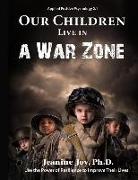- Start
- Our Children Live in a War Zone: Use The Power of Resilience to Improve Their Lives, Applied Positive Psychology 2.1
Our Children Live in a War Zone: Use The Power of Resilience to Improve Their Lives, Applied Positive Psychology 2.1
Angebote / Angebote:
The evidence is clear that teaching children, especially our most vulnerable children, skills that increase social and emotional competence, resilience, emotional intelligence, happiness, cognitive abilities, and psychological flexibility significantly improves the outcomes of their lives resulting in: * Higher high school graduation rates * Prevention of mental health problems * Higher college admission rates * Stronger families * Higher college graduation rates * Less likely to be involved in crime and violence * Less likely to have drug and alcohol problems * Better long-term physical health outcomes, more physical activity, less obesity * Better long-term mental health outcomes, including less depression and fewer suicide attempts Resilience provides the life-line that can lead poor children out of poverty, end the cycle-of-violence in families, and end the school-to-prison pipeline that is prevalent in low-income neighborhoods. That we know it works and aren't providing it to every child is child neglect on a global scale. Resilience protects children and adults against poor outcomes when negative events happen. We never know who will experience a sudden loss, an act of violence, or another form of trauma, but we can provide resilience training that empowers them with knowledge and skills that empower them to weather any storm. Many streets in the United States have the same impact on the physical and mental health of our children as war-torn streets in other countries. Violence is violence, whether it is the result of a declared war or hopelessness and poverty. The power to change the outcome for children in any war zone, here or abroad, begins with resilience. Compelling evidence from studies that followed children for a decade show we must do this. Resilience should be taught in every school, but that's not happening. That's the bad news. The good news is that any individual, family, teacher, or community can follow the steps provided in this book and build resilience in themselves and their families or students. We don't have to wait for anyone to help us--we can help ourselves by learning these critical life skills. The knowledge and skills necessary to make a significant difference in your child's life are easy to implement because they were designed with an understanding of what helps humans thrive. What world do we want our children and grandchildren to live in? Today, 1 out of every 32 Americans is incarcerated or on parole. We can do better. We should do better. Now that we know what stops the cycle-of-violence and school-to-prison pipeline, we have a moral obligation to use the knowledge to help children fulfill their potential. Jeanine Joy's work focuses on preventing problems before they occur. She is a Ph.D. Candidate who has spent over two decades focused on solving one big question, "What makes humans thrive?" After she'd proved to herself that the answers she'd found worked by using the concepts in her own life and then with friends and small groups, she founded Happiness 1st Institute in 2011. The name comes from the fact that when you get happy first, everything else is easier. Her programs are available at Happiness1st.com, a Thrive More Now Company.
Folgt in ca. 15 Arbeitstagen

![DVD Jazz Guitar [With DVD]](https://support.digitalhusky.com/media/annotations/sorted/284/28483680/CHSBZCOP0328483680.jpg)